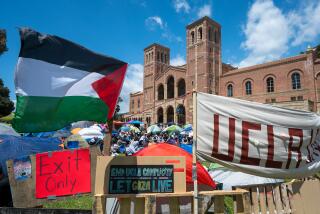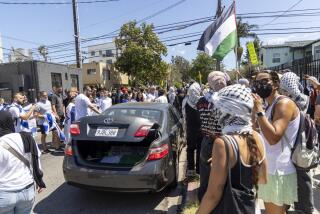Lancaster sued over prayer at council meetings
- Share via
Two Los Angeles County residents filed a lawsuit Tuesday challenging religious invocations by clergy at City Council meetings in Lancaster, where voters last month passed a ballot measure making the practice city policy.
FOR THE RECORD:
Lancaster prayers: An article in Wednesday’s LATExtra section about a lawsuit challenging the constitutionality of religious invocations by clergy at Lancaster City Council meetings misspelled the first name of one of the plaintiffs, Jewish Defense League Chief Executive Shelley Rubin, as Shelly. —
The measure was overwhelmingly approved in April, despite objections from critics who said the policy would largely favor Christian prayer. The vote came after the American Civil Liberties Union sent a letter to the city threatening legal action, saying invocations at city meetings, often “in the name of Jesus,” were divisive and unconstitutional.
The lawsuit was filed by attorney Roger Jon Diamond, who challenged a similar practice in Burbank in 2000 and won a state appellate court ruling saying the practice violated the Establishment Clause of the 1st Amendment.
Diamond sued on behalf of Lancaster resident Maureen Feller, who is Christian but said in the lawsuit that she was upset by prayer at council meetings, and Shelly Rubin, who is Jewish. Rubin, chief executive of the Jewish Defense League, is the widow of Irv Rubin, who was a plaintiff in the lawsuit against Burbank.
Lancaster City Atty. Dave McEwen said that he hadn’t seen the lawsuit but that because clerics of different religious organizations are welcome to deliver the invocation, the practice does not violate the Constitution. Since the beginning of the year, “at least one or two” prayers from non-Christian faiths have been given at council meetings, he said.
“I think it’s a sound policy that meets constitutional requirements,” he said. “We will resist the lawsuit.”
McEwen pointed to a 2008 decision in the U.S. 11th Circuit Court of Appeals in favor of a county planning commission in Georgia that opened meetings with a prayer from clergy or members of the community.
Diamond said sectarian prayer at government meetings is illegal, regardless of which religious beliefs are being expressed. He also said Lancaster was bound by the decision in the Burbank case and not by the 11th Circuit ruling.
“If next week they prayed in the name of Allah, it wouldn’t make a difference,” he said. “It doesn’t help that maybe once in a while, they violate the law in a different way.”
Peter Eliasberg, an ACLU attorney who sent the letter to the city, said that because the California Supreme Court declined to take up the issue in the Burbank case, a different outcome in the Lancaster lawsuit would be unlikely.
More to Read
Sign up for Essential California
The most important California stories and recommendations in your inbox every morning.
You may occasionally receive promotional content from the Los Angeles Times.











